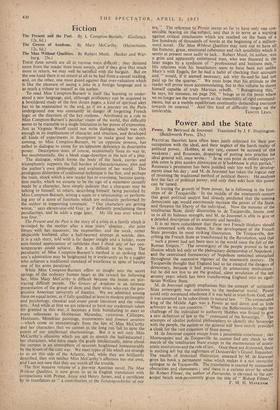Power and the State
Power. By Bertrand de Jouvenel. Translated by J. F. Huntington. (Batchworth Press. 25s.)
POLITICAL theorists have often been justly criticised for their pre- occupation with.the ideal, and their neglect of the harsh reality of political power, Hobbes, at any rate, cannot be accused of this weakness ; and Rousseau, despairing of putting into practice his ideal general will, once wrote : " Je ne vois point de milieu support- able entre la plus austere democratie et le hobbisme le plus parfait." Rousseau's pessimism has been justified only too well by develop- ments since his day ; and M. de Jouvenel has taken the logical step of reversing the traditional method of political theory. He analyses first the fact of political power, and only then asks how this power can be tamed.
In tracing the growth of State power, he is following in the foot- steps of de Tocqueville. In the middle of the nineteenth century that great political analyst had already predicted that the coming democratic age would enormously increase the power of the State, and threaten the liberty of the individual. Now the monster of the totalitarian State, dimly discernible Co de Tocqueville, looms over us in all its hideous strength, and M. de Jouvenel is ,able to give us a detailed description of its anatomy and heredity. It is no mere coincidence that these two French thinkers should be concerned with this theme, for the development of the French State provides its most striking illustration. De Tocqueville, des- cribing the French State as transformed by the Revolution, said that " such a power had not been seen in the world since the fall of the Roman Empire." The sovereignty of the people proved to be an illusion which led only to the plebiscitary dictatorship of. Napoleon ; and the centralised bureaucracy of Napoleon remained untouched throughout the successive regimes of the nineteenth century. De Tocqueville thought that England had so far escapad the dangers of democracy, because it had preserved its aristocratic institutions ; but he did not live to see the gradual, silent revolution of the last seventy years which has been transforming England into an egali- tarian Welfare State.
M. de Jouvenel rightly emphasises that the concept of unlimited Sfate sovereignty was unknown to the mediaeval world. Power could only command obedience if it was held•in trust from God, and it was assumed to be subordinate to natural law. " The consecrated king of the Middle Ages was a Power as tied down and as little arbitrary as we can conceive." When the Reformation brought the challenge of the individual to authority Hobbes was forced to give a new definition of law as the " command of the Sovereign." The attempts of idealist political philosophers to identify this Sovereign with the people, the nation or the general will have merely provided a cloak for the vast extension of State power.
M. de Jouvenel cannot escape from a pessimistic conclusion ; like Montesquieu and de Tocqueville he cannot find any check to the march of the totalitarian State except in the maintenance of aristo- cratic institutions and the rule of law. Once these are destroyed, there is nothing left but the nightmare of Dostoevsky's Grand Inquisitor. The ,wealth of historical illustration amassed by M. de Jouvenel gives his book a permanent value which makes it a not unworthy epilogue to de Tocqueville. The translation is marred by occasional obscurities and clumsiness ; and there is a curious error by which Sir Robert Filmer, the author of Patriarcha, is elevated to the epi- scopal bench and.persistently given the title of " Bishop Filmer."
F. M. H. MARKHAM.


































 Previous page
Previous page